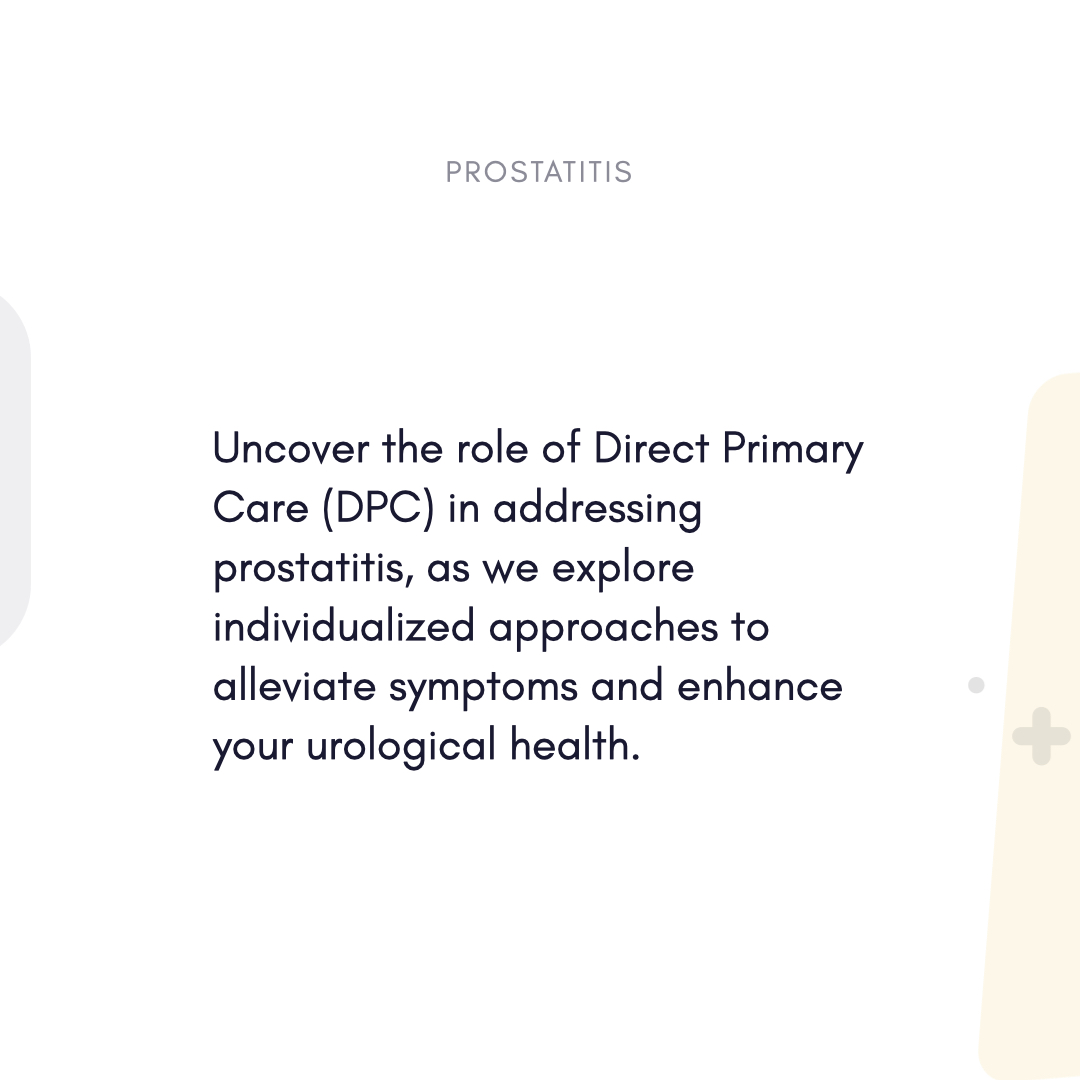Prostatitis and Direct Primary Care (DPC): Personalized Relief for Chronic Pelvic Pain
A burning feeling not going to go away. Pelvic discomfort interfering with intimacy and work. For 8–10% of men with prostatitis, this relentless inflammation of the prostate causes a mental health crisis rather than only physical suffering. There is hope for direct primary care (DPC), which offers a thorough, patient-centered approach to reduce inflammation and restore normalcy while traditional care sometimes prescribes endless antibiotics without addressing root causes.

Recognising Prostatitis
Prostatitis is inflammation of the prostate classified as:
- Acute bacterial refers to Urine urgency (rare) and sudden fever
- Consistent bacterial: Frequent urinary infections, pelvic discomfort
- CP/CPPS, 90% of cases: pelvic discomfort non-bacterial lasting more than three months
Typical triggers:
- Functional problems of the pelvic floor
- Responses in autoimmonia
- Anxiety or stress
Mismanagement carries hazards:
- Chronic pain syndrome
- Erectile problems
- Social isolation or depression
For CPPS, the American Urological Association (AUA) stresses multimodal treatment.
DPC's Transformational Power Treating Prostatitis
Operating on a membership model usually 50 USD–150 USD/month, Direct Primary Care (DPC) provides unlimited access to your physician for a set fee. For those with prostatitis, this means no co-pays, no hurried visits, and a treatment schedule as consistent as your symptoms.
1. Fast Targeted Treatment and Diagnosis
The accessible model of DPC guarantees:
- Same-day urine cultures and EPS testing to exclude infection.
- Internal pelvic exams help to evaluate muscular tenderness or spasms.
- Antibiotics (if bacterial), alpha-blockers, or amitriptyline are quick fixes.
2. Customised, Multimodal Treatment
DPC doctors design customized programs compliant with AUA standards:
- Pelvic floor therapy: Referrals to specific PTs for internal trigger point release.
- For CPPS driven by anxiety, cognitive-behavioral therapy (CBT) or SSRIs for stress management.
- Low-dose naltrexone, pollen extracts, or quercetin—anti-inflammatory treatments.
3. Complete, Reasonably Expensive Support
By cutting medication costs—wholesale pricing for tamsulosin or gabapentin—DPC lessens both financial and emotional burden.
- 24-hour telehealth availability: Control flare-ups or side effects from medications.
- Diet plans avoiding spicy foods, bladder training, and warm sitz baths under lifestyle coaching.
DPC's advantages for prostatitis sufferers
1. Unmatched Approachability
- 24/7 access for a provider during urinary retention or nocturnal pain spikes.
- No waits for pelvic PT or urologist referrals.
2. Individualized Interventions
- Bacterial cases: Regular culture checks combined with long antibiotics.
- Neuromodulators (pregabalin) + acupuncture referrals is CPPS.
3. Clear Affordability
- Membership consists in consultations, basic labs, and care coordination—no hidden costs.
- Typical savings: 2,000 USD+ yearly by cutting ER visits and pointless surgeries.
Personal Success Stories from Real Life
- Case 1: After two years of CPPS, 42-year-old Mark discovered relief with DPC-prescribed pelvic PT and amitriptyline. Symptoms dropped eighty percent over three months.
- Case 2: Raj, 35, avoided years of useless antibiotics by receiving tailored PT and stress management through DPC after misdiagnosed with chronic bacterial prostatitis.
Questions of FAQ: Prostatitis and DPC
- Q: Can DPC manage repeated UTIs resulting from chronic bacterial prostatitis?
- A: Sure. DPC doctors secure discounted cystoscopies, write long-term suppressants, and order semen cultures.
- Q: DPC seems reasonable for long-term CPPS management.
- A: Perfectly true. Members steer clear of expensive specialist loops, save on PT co-pays and drugs.
- Q: What about other therapies including acupuncture?
- A: A DPC provider works out cash rates with pelvic floor therapists and acupuncturists.
Why DPC Benefits Patients With Prostatitis
Emphasizing DPC's alignment with CPPS recommendations, the International Continence Society supports:
- Interdisciplinary treatment combines mental health, PT, and urology.
- Tools to monitor pain triggers and therapy responses empower you.
- Trust: A consistent partner replaces the "diagnostic odyssey."
Release Pelvic Pain
There is no life sentence for prostatitis. Using DPC helps you to find a partner who listens closely, constantly innovates, and prepares you to take back comfort and confidence—today.






